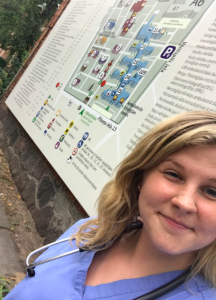Katrina Jackson, Class of 2021

Katrina on campus at the Pauls Stradins University Hospital in Riga, Latvia.
This summer, Katrina traveled to Riga, Latvia to study and get hands-on experience in a foreign healthcare system. She was able to work in both the Emergency Department of the capital city’s largest hospital as an ER tech, as well as on an ambulance serving some of the poorer neighborhoods in Latvia. While the medical experience was extremely valuable, Katrina says she found the political and financial comparisons of the American versus Latvian healthcare systems to be one of the most interesting aspects of her trip.
What inspired you to intern in a foreign healthcare system this summer?
My family is from Latvia and I have many connections to the country, so I was excited to visit family and learn more about my heritage, while still gaining some intensive medical experience. I also wanted to put my training as an EMT to use in a country which is further behind in modern medicine/healthcare, partly due to its history of Soviet occupation. It was incredibly interesting to see first-hand the differences between the US emergency health system and the Latvian system.
What is one lesson you feel you learned after this experience?
One important thing I learned during my trip was the importance of body language in medical treatment. This sounds fairly insignificant, but a smile or similar sign of reassurance can make an incredible difference in situations where a patient is in pain or is unsure what the future holds. Latvia also has a large Russian population so, while I speak Latvian, I could not communicate well with the patients who spoke Russian. It was in these times, especially, that I could appreciate the power of gestures and body language in tense situations. All people, regardless of what language they speak or where they come from, want to know that they are being helped and that someone is there for them. It’s a fairly simple lesson, but an important one which sometimes goes unnoticed in today’s busy health system, I think.

